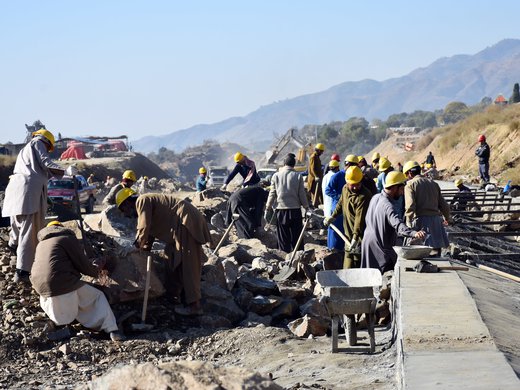The key message from the International Monetary Fund’s (IMF’s) most recent global economic projections is that the global economy is generally doing well, but the (seemingly never ending) recovery is uneven and there remain significant short and medium term risks. The global growth forecast is 3.5 percent which is equivalent to average global growth since 1980 — when the IMF’s database begins. However, in a speech delivered a week ago Christine Lagarde, the Managing Director of the IMF, very subtly made the point that economic progress is not about growth as an abstract number, but rather it’s about improvement in quality of life.
The IMF highlighted several risks that may affect its economic forecasts, including: global financial instability, commodity price volatility, geopolitical risks, and low potential growth in advanced and emerging market economies. Malcom Knight recently published a CIGI Paper that provides a very nice account of the policies and reforms that remain to be completed in international financial regulation in order to minimize and mitigate shocks to the global financial system. I will briefly highlight a few policies that I believe are not adequately represented in the economic policy discussion and can support Lagarde’s subtle call for quality over quantity, while also addressing several of the other risks to the global economy.
The first policy suggestion, and currently a very popular one, is infrastructure investment; however, I would like to emphasize the importance of investment in green infrastructure. Climate change both represents a risk to global economic stability and an opportunity to advance global economic prosperity. However, because the major risks from climate change (including weather volatility, natural disasters, social instability and the spread of disease) are all taken as exogenous in economic models, they are often perceived as an external force that cannot be forewarned or adequately addressed in advance. Indeed, these risks were not at all pointed out in the IMF’s April 2015 World Economic Outlook. Outside of these economic models, the probability and magnitude of the risks from climate change are visible and increasing, and they should most likely be dealt with using the precautionary principle.
Green infrastructure investment may include reusable energy projects (for example, hydroelectric dams, wind turbines, and solar-thermal power stations), or urban planning projects (for example, improving public transit systems and/or the use of urban space for residential and commercial activity). The potential economic benefits of policies that address climate change are threefold. First, the construction of infrastructure involves short term stimulus and creates jobs; thus improving potential growth. Second, by establishing more stable sources of energy and improving urban development, a stronger environment for economic activity to flourish is created while also reducing our vulnerability to volatile prices of fossil-fuels. Third, over the longer-term, decreasing the risks associated with climate change can help prevent the creation or escalation of geopolitical tensions over, for example, depleting water and food resources.
Economic development is the second policy area that is crucial for ensuring that global growth is a matter of quality over quantity. Developing and emerging market economies mostly concentrated in the Global South represent a massive and largely untapped market. In order to unleash this economic potential, however, we need to create stable social conditions by improving the quality of health and education. Furthermore, development policies should attempt to empower local populations to make progress according to their own values while also integrating with global economic processes. Creating a stable environment in developing countries while encouraging participation in the global economic environment can create a massive opportunity to raise potential global growth. It may also reduce the risk of geopolitical tensions by decreasing global and national inequality and increasing participation in global economic policies.
A third policy that I believe should be a focus in order to improve the quality and quantity of economic growth is raising the participation of women in the labour force. By doing so, not only can we increase potential growth by directly increasing total economic capacity, but we can also decrease the gender gap that often feeds geopolitical tensions. Policies to improve the female labour force participation rate range from basic services for women’s health, to incentives for higher educational attainment for women, to social policies concerning child care and maternity leave.
Climate change, social development, and raising the status of women are a few of the policies that can help to achieve quality over quantity in global economic growth. I have focused on these areas specifically because this year marks an important one for global governance to potentially make progress. The United Nations will be hosting three important conferences related to sustainable development and addressing climate change: the International Conference on Financing for Development will take place in Ethiopia in Julythe adoption of the Post-2015 Development Goals will occur in New York in September; and the United Nations Climate Change Conference will be held in Paris this December. At the same time, Turkey holds the G20 Presidency and will be passing the torch onto China. As members of the G20 Troika for the next two years, these two major emerging market economies are in a good position to advance the development agenda. To top it all off, the G20 has already set goals to improve the female labour force participation rate.
2015 is the year to make progress, but to do so we need the IMF to more explicitly acknowledge the importance of quality over quantity in global economic progress.


